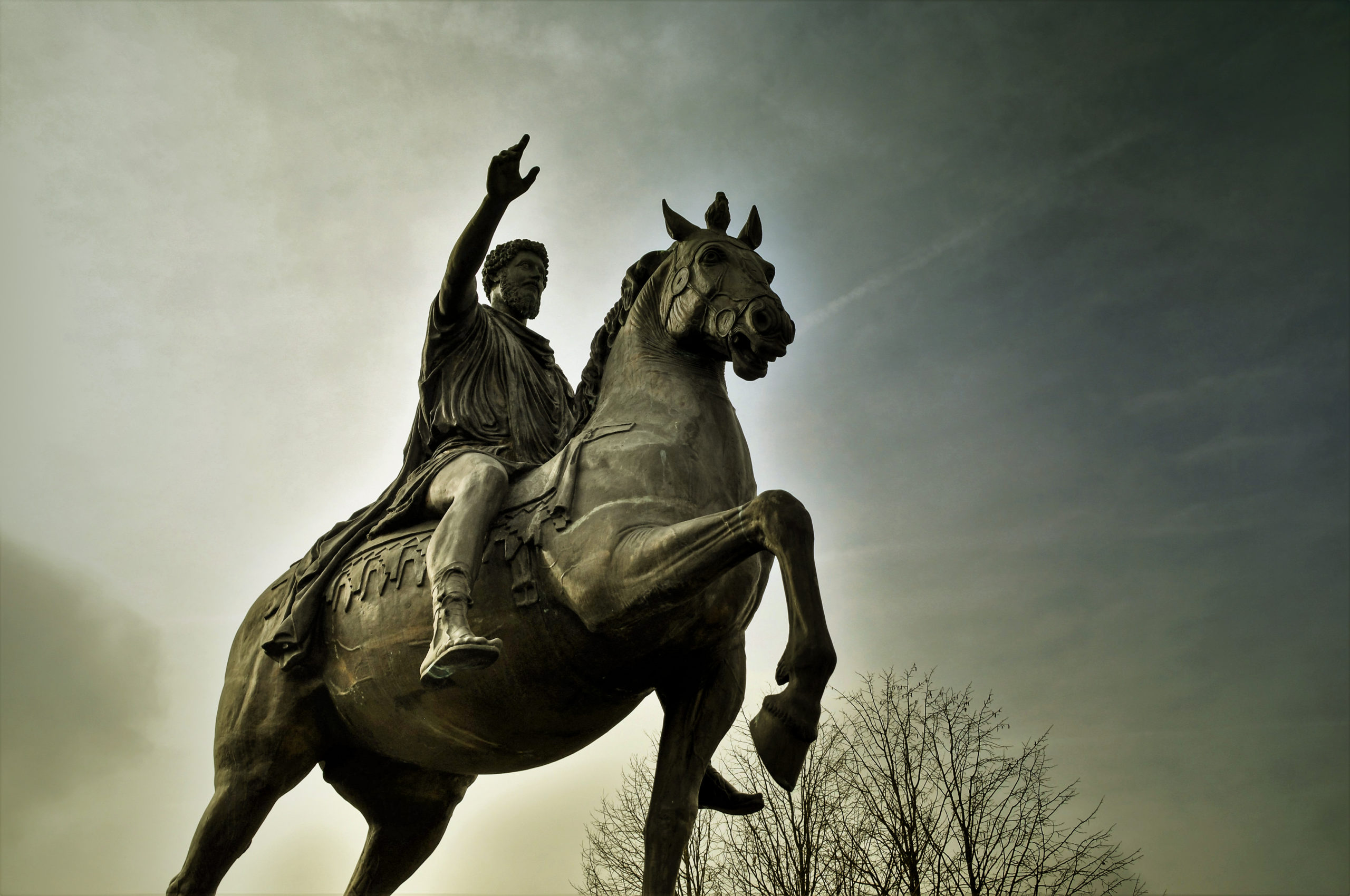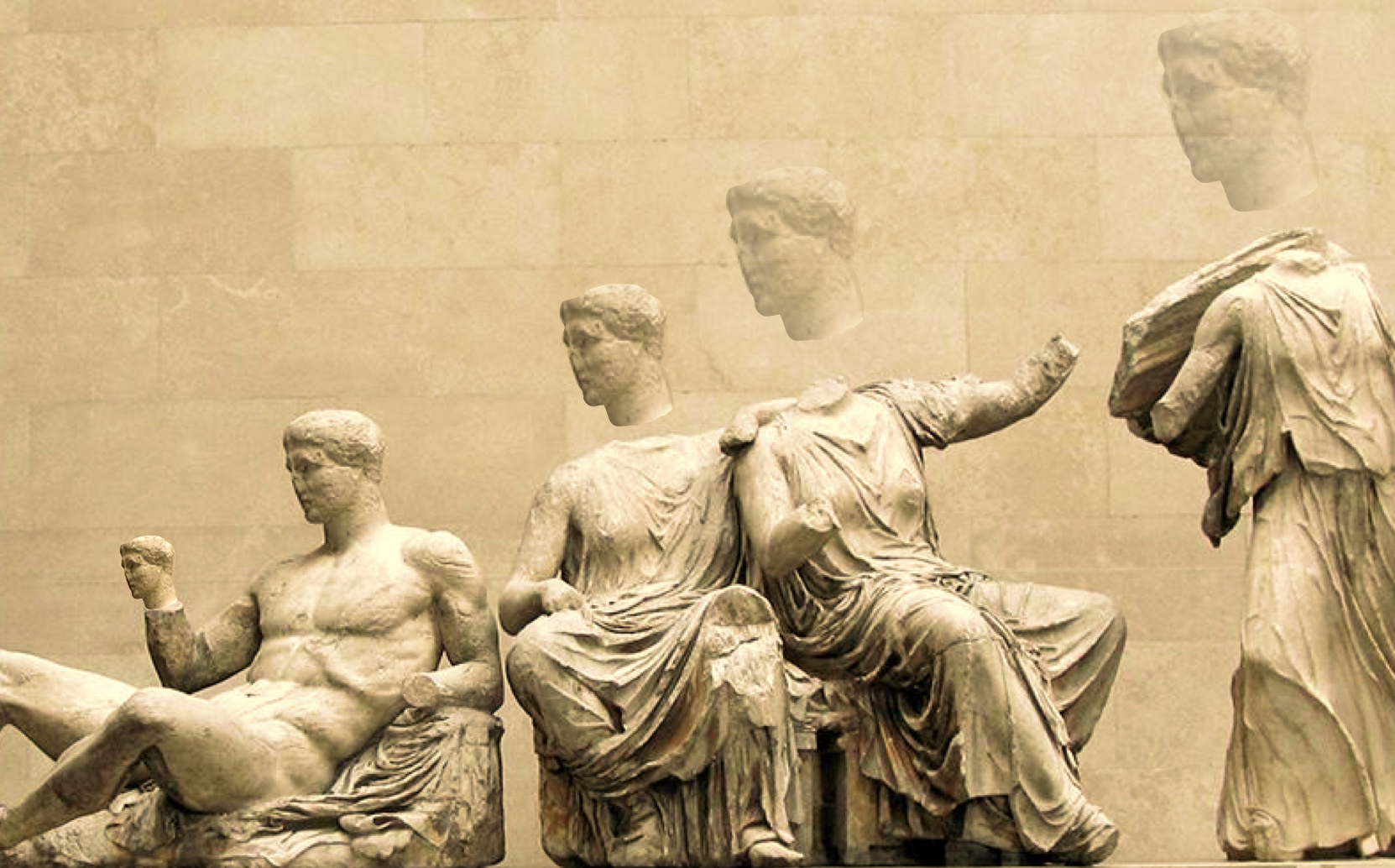The Deepest Chasm in our Political Landscape
Come Together

Is Stoicism strong enough to make things cohere?
The following is Spencer Klavan’s foreword to the forthcoming Gateway to the Stoics, available to order here.
What could possibly be strong enough to stitch the world back together? That question hangs in the air these days as it must have in the early days of the Roman Empire. The Mediterranean had seen roughly three centuries of social crack-up and political fracture, from the death of Alexander the Great (323 B.C.) to the triumph of Octavian, soon to be renamed Augustus Caesar, at the Battle of Actium (31 B.C.). This Hellenistic Period may fairly be characterized as a thoroughgoing mess of dynastic competition and social unsettlement. All over what was once Alexander’s empire, rival monarchs jockeyed for control. Rome, ever more powerful abroad, all but imploded domestically as the stress of territorial expansion proved too much for its venerable republican institutions to bear.
From this confusion Augustus emerged, spattered with gore but imposing in victory, proclaiming his intention to usher in a new world order. But would it stick? Within 50 years after Augustus’s own death, there were already reasons for serious doubt. For one thing, as history had amply demonstrated and philosophers had fruitlessly warned, autocracy is risky business. Those who submit to imperial conquerors must also suffer under petulant sociopaths, of which Rome certainly saw her fair share. Augustus’s successors, the Julio-Claudians, had a singularly mixed record of success, culminating in eight years of terrifying dictatorial caprice under the infamous Nero.
For another thing, and perhaps still more disturbingly, very few people were quite sure what to believe in. The confidence of Athens’s golden age had long faded, and the philosophical tradition that began with Socrates had splintered into uncountable competing schools of thought. Was the world a tangled flux of atoms moving through an infinite void without divine oversight, as Epicurus of Samos proposed? Or was reality a sublime fusion of mind and matter, as suggested by the followers of Aristotle? Did the world of flesh and blood have some governing logic—and if so, why did everyday life seem so fearsomely unpredictable? It was no easier to settle these questions with authority than to bring peace to the political landscape.
That was the state of things when Paul of Tarsus, a fiercely erudite Jewish sectarian with an incendiary newfound passion for preaching the resurrection of a man called Jesus, arrived in Athens. “All the Athenians and resident foreigners passed their time doing nothing but discussing or listening to the latest novel idea,” says the Bible’s Book of Acts (17:21). Paul’s task was to convince these searching intellectuals, in an era of chronic disarray, that there was one God who ruled over all creation—and it wasn’t Caesar.
It is telling that when Paul recited pagan philosophy back at his Greek listeners, he reached for the Stoics. He was learned enough to have a range of citations at his disposal—he could have appealed to Epicurus, or Aristotle, or even to Plato’s accounts of Socrates himself to make his case. But instead he quoted Aratus, a writer of Stoic pedigree: “As some of your own poets have said, ‘We are his offspring’” (Acts 17:28). That line, from Aratus’s adoration of Zeus as wellspring of all human life, was Paul’s inroad to evangelism.
It was not a cliché in antiquity, as it is now, to say that all men are brothers. In 1948, the United Nations took it as self-evident that “all human beings…are endowed with reason and conscience and should act towards one another in a spirit of brotherhood.” It was easy then to assume that U.N. leaders were speaking the plainest common sense, obvious to all decent and civilized people. But of course we only feel that way because Christianity so successfully installed this remarkable doctrine as a foundational moral absolute, not to be contested except on pain of the harshest censure. In the days of Stoicism, though, the brotherhood of man was far from obvious. It was an imaginative and daring minority view.
“Some men are different from others to the same extent as the soul differs from the body, and humanity from the beasts,” wrote Aristotle in the fourth century B.C. (Politics 1.5, 1254b). In the Republic, Plato’s Socrates speculates that the perfect government would treat its citizens as if they differed from one another in their very souls, the inferior workmen among them made of spiritual iron and brass as compared with the gold of the natural rulers (Book III, 414c–17b). Later on, Socrates floats the possibility of discreetly leaving infirm babies to die rather than letting them pollute the gene pool further (Book V, 459d–e). Plutarch reports that the Spartans put this theory into gruesome practice, though he may have been describing the extreme rather than the norm (Life of Lycurgus 16). Still, when we read about women dousing babies in wine so that “epileptic and sickly infants” would be “thrown into convulsions” and thus reveal themselves as candidates for slaughter, it is hard not to shudder.
Yet we shudder only because, in this respect at least, the Christian Church has made Stoics of us all. In the harsh and desperate conditions of the ancient world, it must have seemed perfectly natural that only the strongest were meant to survive and only the best deserved to be free. The Stoics were proposing something altogether counterintuitive: that regardless of their relative status or strength, human beings were born without exception into the same state of cosmic dependency. “Will you not remember who you are, and whom you rule?” asked the Stoic Epictetus. “Your slaves are kinsmen, brothers by nature, children of Zeus” (Discourses I.13). Epictetus had been a slave himself under Emperor Nero’s secretary Epaphroditus—“Sickly from birth,” writes Russell Kirk, “he is said to have been tortured by his master, and to have learned from hapless suffering that happiness is the product of the will, not of external forces.” Perhaps, like Frederick Douglass after him, Epictetus also learned from studying his own example that a body in chains is not the same thing as a degraded soul.
In fact, for the Stoics, strokes of bad luck and reversals of fortune were sources of invaluable wisdom. Zeno of Citium, Stoicism’s first leader or “scholarch,” was a on a lucrative business trip when he washed up suddenly in Athens after a shipwreck. There he met Crates the Cynic, a well-known exponent of a philosophy whose most notorious feature was ostentatious disregard of public opinion. For the Cynics, social protocol was an object of pointed scorn: Diogenes of Sinope, an earlier Cynic and also briefly a slave, bore witness to his outlook on life by living in a barrel and masturbating in public (Diogenes Laertius, Lives of the Eminent Philosophers 6:69–70). Zeno was too shy to engage in such flamboyant displays of transgression himself. But he was taken with the notion that true freedom—from material encumbrance, from personal attachments, and from self-regard—could be found among the wretched of the earth.
Gradually, these observations crystallized into a wholesale account of thought (logic), action (ethics), and the universe (physics)—the three interlocking parts of a complete philosophy. Stoicism was named after the stoa poikilē, or “painted colonnade,” a public walkway decorated with sprawling murals where Zeno and his protégés met. The stoa’s central scene was the Battle of Marathon, in which Athens had led Greek forces to improbable victory against a colossal invading force from Persia, with famous heroes alongside serene Olympian gods. A tangle of human conflict within a divinely ordered universe: these themes of the stoa poikilē were the themes of Stoicism too. In stark contrast to their major rivals, the Epicureans, Stoics taught that divine logic was actively at work everywhere and always. “Constantly regard the universe as one living being, having one substance and one soul,” writes the Roman emperor Marcus Aurelius in Book IV (40) of his Notes to Himself (ta eis heauton) better known in English by the title Meditations. The Stoics called this one great mind by many names—it was spirit (pneuma) and fire (pur); it was God (Zeus) and reason (logos). It was a pervading logic that governed everything—from laws of physics to moral imperatives, from the wheeling of the planets overhead to the first and last breath of a human life. This divine principle was the starting point of all Stoic thought.
Self-Talk
The Meditations lay bare the mind of a man trying sincerely to internalize these observations. Aurelius is not a dogmatist but a seeker, torn reluctantly from his books by his rise to the throne in A.D. 161. His notes have an almost obsessive quality to them, as if Aurelius muttered the words under his breath and directly onto the page. They are what we might now call “self-talk,” the little murmurs of reproach and encouragement we say to remind ourselves what we believe and who we want to be. It is almost painfully touching to enter into the private confidence of this great man and to encounter him as he knew himself: vulnerable, uncertain, but determined to honor what was best in him and in humanity.
As he grappled with his own weaknesses and scrutinized his own convictions, Aurelius constantly presented himself with one great choice between alternatives: “either there is providence or atoms” (IV.3, cf. VI.24, IX.39). By this he means that either Epicurus is right, and reality is nothing but particles shooting endlessly through a void, or the Stoics are, and the world is woven through at every point with divine intention and care. Aurelius’ money was on the Stoics. But either way, he wrote, “remember to retire into this little territory of thy own.” The lifelong project of Stoic ethics is to invest your attention and emotion only in what you can control. This is what fosters the manly resolve that we still call “stoic.”
Aurelius kept himself grounded in these ideas by poring over the words of Epictetus, whose views were collected by the historian Arrian in a longer treatise called Discourses and a shorter précis or Handbook (Enchiridion). “You can be invincible, if you enter into no contest in which it is not in your power to conquer,” counsels Epictetus (XIX). In practice this attitude can seem callous, especially when it means shrugging off the deaths of your own children. But we will gravely misunderstand both Aurelius and Epictetus if we think of them as heartless theorists, abstracting away their own pain. In point of fact, their aspiration was quite different: they were trying to treat all affliction equally, whether their own or that of others. “You must know that when your cup is also broken, you ought to think as you did when your neighbor’s cup was broken” (XXVI). While the Christians were preaching to love thy neighbor as thyself, the Stoics were teaching to love thyself only as much as thy neighbor—to accept all human fortune and misfortune as part of the same divinely foreordained pattern.
And so the famous impassivity turns out to be closely linked with the radical brotherhood of man: both are premised on the conviction that one rational mind governs all time and space. That conviction in turn justifies the idea of oikeiōsis, a “family relationship” between all mankind. One Stoic, Hierocles of Alexandria, imagined this kinship radiating outward from himself in concentric circles, until the whole world became linked with him in mutual dependency on divine providence (Stobaeus, Anthology 4.27.23). That is how one philosophy could hold true for the slave of a slave and the emperor of Rome, how a world of political and social disunity could come under the governing power of one heavenly logic.
No wonder Paul, surveying the rival philosophies of his time, found material in Stoicism that he could work with. When he wrote to the new Christians in Rome that some pagans “show that the directives of the law are written on their hearts,” he must have had the Stoics, among others, in mind (Romans 2:15). The point becomes especially clear in certain letters by Seneca, who, like Epictetus, served under Nero—though as a tutor and advisor, not a slave. Seneca suffered his own fall from grace and was compelled to suicide, a fate he endured with the courage of a true philosopher. For he knew already that the rain falls on the just and the unjust, and he joined Epictetus in declaring that all men are brothers: “Your slaves are men, companions, lowly friends,” he wrote to Lucilius, a government official in Sicily. “Indeed, they are your fellow slaves, if you only consider how drastically fortunes can change” (Letter 47). Here again are echoes of the God Paul preached, alive in the minds of Gentiles as well as Jews.
Paul surely believed that unaided reason can only dimly glimpse what revelation unveils in full. But men like Aurelius, Seneca, and Epictetus had begun to see what John’s Gospel also proclaimed: that the logos, the divine “Word” or reason, is threaded through all creation. So Kirk writes poignantly that “the Stoic philosophy of which Marcus Aurelius was the last great representative prepared the way for the acceptance of Christianity in the dying classical world; and thus, as if he were the instrument of the Providence which he knew to govern this earth, the philosopher-king lived, unknowingly, for the sake of a religion which he persecuted.” It was not the first or the last time Christ would use his own persecutors to proclaim his own Gospel, as Paul himself could have attested from personal experience. The omnipresent logos has a way of “gathering all men” unto itself—of bringing together even the most ferocious of archenemies (John 12:32).
r/logos
All this makes it significant that today, in an era of bitter partisanship and social animus, Stoicism is having a renaissance. Aurelius has always been popular among generals, statesmen, and soldiers. But now even more obscure figures like Zeno and Epictetus are drawing a far wider audience. Books like The Daily Stoic by Ryan Holiday have been hugely successful, and the sub-reddit r/Stoicism, an online forum for applying Stoic teaching to daily modern life, has 496,000 members as of this writing (they call themselves prokoptontes, a Greek word for students making progress along a course of study). Members of this online stoa (mostly young men, by the looks of it) mine the great texts for insight on everything from dating and social niceties to career strategy and physical fitness. Like Aurelius, they rebuke themselves for losing sight of their principles (“I still cannot believe i absolutely failed at stoicism” is the title of one popular post with which Aurelius could surely relate). But like all Stoics, they keep on reaching for meaning in the messiness of things.
Small wonder they would want to. They are coming of age within the disorienting atmosphere of digital technology, an immersive and all-encompassing new environment of constant and competing claims upon human attention. The ruling dynamic of the online world often seems to be not order but atomization, an Epicurean chaos of people, images, and ideas hurtling at random through an endless void. Users of social media get daily streams of half-digested “content”—a fragment of Elizabethan drama here, a news clip there, then a podcast and maybe a nude photograph. The institutions that might otherwise help make sense of it all—families, universities, political parties—are either crumbling into dysfunction or contracting the sickness themselves.
And so plenty of people have tried grasping onto racial essentialism or sexual adventurism, adopting a “marginalized identity” in the hopes that it will serve as a stable foothold in the endless digital sandstorm: maybe if I’m part of the nonbinary community, then I’ll matter. But identities proliferate as ceaselessly as pixels and dissolve back just as easily into the data stream. So, as in the Hellenistic era and the early Roman Empire, we are left wondering once again: What could possibly be strong enough to stitch the world back together?
That is why Stoicism has new appeal: it promises to make things cohere. And insofar as it does—insofar as it points its new enthusiasts toward a higher logic and a truer purpose in the nature of things—its popularity is a welcome development. But I notice also that twenty-first-century Stoics have a habit of trying to evacuate their preferred philosophy of its metaphysical content. One post on r/Stoicism asked users to share their criticisms of Stoic teaching, and an awful lot of commenters responded that they preferred to separate out the ethical teachings from the theological ones (“I can’t use the ‘Gods’ stuff. So, I ignore it,” wrote one. Another said, “I’m an atheist” and rejected “some of the theology veins.” Another couldn’t sign on to “some of the metaphysics”).
Or take cognitive behavioral therapy (CBT), a popular mode of psychiatric care whose forefather, Albert Ellis, studied Epictetus closely. Patients in CBT learn to study and correct their own reflexive thought patterns by observing them in moments of dispassion. The consonance with Stoic practice is obvious. But unlike Stoicism, writes psychotherapist John Mathews, CBT “does not posit any hypotheses about the greater workings of the universe, or a higher power.” In this, modern Stoicism and its variants are of a piece with “Christian atheism,” the recent trend of behaving as if Christian ethics were true but disavowing belief in God. Philosophers and writers like Don Cupitt and Marcello Pera recognize the beauty of what Christendom built but can’t bring themselves to accept what Christians believe. It seems all sorts of people want divine reason without a divine source.
The conversations on r/Stoicism, and the techniques of CBT, give people actionable advice for taking back agency in their own lives. In a news cycle which constantly broadcasts new global crises and social justice imperatives, Stoic detachment can help alleviate rising anxiety: those who focus on what is in their control can stop fretting over a world that seems constantly on the verge of ending. All of that is to the good.
But in the long run, without God, Stoicism cannot save. Even the best teachings of the pagan world collapse into incoherence when you remove their first and final cause: If all men are brothers, as Epictetus taught, then who is their father? If you find peace in surrendering to providence, as Aurelius did, then whose providence are you surrendering to? Either the profound cosmic sayings in this volume are useful but empty metaphors, or they refer to something real.
The Stoics were right that one governing reason keeps the stars in balance and can guide the paths of the human heart, even now. But if that reason is to bring the whole world into order, if it is to make sense of the internet and space travel and the wars of great powers in a nuclear age, then it must be more than a figure of speech. It must be the working of a true cosmic mind, the real eternal logos of the Stoics in which Paul discerned the footsteps of his God.
The American Mind presents a range of perspectives. Views are writers’ own and do not necessarily represent those of The Claremont Institute.
The American Mind is a publication of the Claremont Institute, a non-profit 501(c)(3) organization, dedicated to restoring the principles of the American Founding to their rightful, preeminent authority in our national life. Interested in supporting our work? Gifts to the Claremont Institute are tax-deductible.
An alternative to dystopia.
The biomedical security state.
Our human need for connection should keep us grounded in reality.




